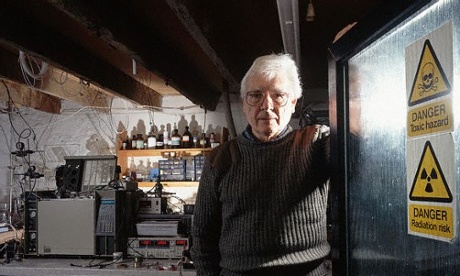James Lovelock: environmentalism has become a religion
Scientist
behind the Gaia hypothesis says environment movement does not pay
enough attention to facts and he was too certain in the past about
rising temperatures

Environmentalism has "become a religion" and does not pay enough attention to facts, according to James Lovelock.
The 94 year-old scientist, famous for his Gaia hypothesis that Earth is a self-regulating, single organism, also said that he had been too certain about the rate of global warming in his past book, that "it’s just as silly to be a [climate] denier as it is to be a believer” and that fracking and nuclear power should power the UK, not renewable sources such as windfarms.
Speaking to the Guardian for an interview ahead of a landmark UN climate science report on Monday on the impacts of climate change, Lovelock said of the warnings of climate catastrophe in his 2006 book, Revenge of Gaia: "I was a little too certain in that book. You just can’t tell what’s going to happen."
“It [the impact from climate change] could be terrible within a few years, though that’s very unlikely, or it could be hundreds of years before the climate becomes unbearable," he said.
Lovelock's comments appear to be at odds with dire forecasts from a report by the Intergovernmental Panel on Climate Change on Monday, which leaked versions show will warn that even small temperature rises will bring "abrupt and irreversible changes" to natural systems, including Arctic sea ice and coral reefs.
Asked if his remarks would give ammunition to climate change sceptics, he said: "It’s just as silly to be a denier as it is to be a believer. You can’t be certain."
Talking about the environmental movement, Lovelock says: "It’s become a religion, and religions don’t worry too much about facts." The retired scientist, who worked at the Medical Research Council, describes himself as an "old-fashioned green."
Lovelock reiterated his support for fracking for shale gas, which has been strongly backed by David Cameron and the government but vigorously opposed by anti-fracking activists and local people at sites from Salford to Balcombe in West Sussex.
“The government is too frightened to use nuclear, renewables won’t work –because we don’t have enough sun – and we can’t go on burning coal because it produces so much CO2, so that leaves fracking. It produces only a fraction of the amount of CO2 that coal does, and will make Britain secure in energy for quite a few years. We don’t have much choice," he said.
Craig Bennett, director of policy and campaigns at Friends of the Earth, said: "I think every year it becomes harder to generalise about environmentalism. These days it ranges from people like green activists of the 1970s who Lovelock perhaps has in mind through to chief executives who say this is one of the most pressing concerns we have to address."
"The environmental community is no longer a minority but a majority of people who are concerned about the planet. That makes it much harder than ever to pigeonhole who the environmental community is."
The 94 year-old scientist, famous for his Gaia hypothesis that Earth is a self-regulating, single organism, also said that he had been too certain about the rate of global warming in his past book, that "it’s just as silly to be a [climate] denier as it is to be a believer” and that fracking and nuclear power should power the UK, not renewable sources such as windfarms.
Speaking to the Guardian for an interview ahead of a landmark UN climate science report on Monday on the impacts of climate change, Lovelock said of the warnings of climate catastrophe in his 2006 book, Revenge of Gaia: "I was a little too certain in that book. You just can’t tell what’s going to happen."
“It [the impact from climate change] could be terrible within a few years, though that’s very unlikely, or it could be hundreds of years before the climate becomes unbearable," he said.
Lovelock's comments appear to be at odds with dire forecasts from a report by the Intergovernmental Panel on Climate Change on Monday, which leaked versions show will warn that even small temperature rises will bring "abrupt and irreversible changes" to natural systems, including Arctic sea ice and coral reefs.
Asked if his remarks would give ammunition to climate change sceptics, he said: "It’s just as silly to be a denier as it is to be a believer. You can’t be certain."
Talking about the environmental movement, Lovelock says: "It’s become a religion, and religions don’t worry too much about facts." The retired scientist, who worked at the Medical Research Council, describes himself as an "old-fashioned green."
Lovelock reiterated his support for fracking for shale gas, which has been strongly backed by David Cameron and the government but vigorously opposed by anti-fracking activists and local people at sites from Salford to Balcombe in West Sussex.
“The government is too frightened to use nuclear, renewables won’t work –because we don’t have enough sun – and we can’t go on burning coal because it produces so much CO2, so that leaves fracking. It produces only a fraction of the amount of CO2 that coal does, and will make Britain secure in energy for quite a few years. We don’t have much choice," he said.
Craig Bennett, director of policy and campaigns at Friends of the Earth, said: "I think every year it becomes harder to generalise about environmentalism. These days it ranges from people like green activists of the 1970s who Lovelock perhaps has in mind through to chief executives who say this is one of the most pressing concerns we have to address."
"The environmental community is no longer a minority but a majority of people who are concerned about the planet. That makes it much harder than ever to pigeonhole who the environmental community is."

No comments:
Post a Comment